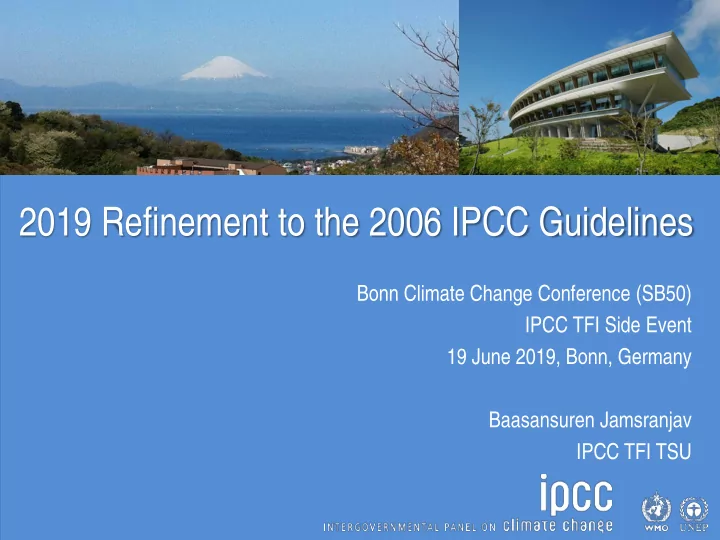

2019 Refinement to the 2006 IPCC Guidelines Bonn Climate Change Conference (SB50) IPCC TFI Side Event 19 June 2019, Bonn, Germany Baasansuren Jamsranjav IPCC TFI TSU
New Supplementary Guidance in 2013 IPCC Inventory Guidelines + and UNFCCC Currently, Non Annex I Parties use these under the UNFCCC. Annex I Parties must use from 2015 GPG2000 GPG2003 Non-Annex I Parties are encouraged (non-LULUCF) (LULUCF) to use GPGs. 2006 IPCC Guidelines 1995 IPCC Revised 1996 IPCC Guidelines Guidelines Actually, 2006 IPCC Guidelines are being used by more and more Non-Annex I Parties. Revision/Update by the IPCC
Paris Agreement and National GHG Inventory • In order to build mutual trust and confidence among the Parties and to promote effective implementation of the Paris Agreement, a transparency framework for action needs to be enhanced. • To that end, it is essential that all the Parties produce and report high- quality and reliable national GHG inventories (national emission data). • Paris Agreement Article 13, paragraph 7: – Each Party shall regularly provide …: (a) A national inventory report of anthropogenic emissions by sources and removals by sinks of greenhouse gases, Source: IISD/ENB prepared using good practice methodologies accepted by the Intergovernmental Panel on Climate Change and…
Need for refinement of 2006 IPCC Guidelines • 2006 IPCC Guidelines – 13 years ago!! • In August 2014, TFI Bureau discussed and concluded: – The 2006 IPCC Guidelines provide a technically sound methodological basis of national greenhouse gas inventory, and therefore fundamental revision is unnecessary. – To keep the validity of the 2006 IPCC Guidelines , certain refinements may be required, taking into account scientific and other technical advances that have matured sufficiently since 2006. • In October 2016, IPCC decided to prepare a new Methodology Report titled “2019 Refinement to the 2006 IPCC Guidelines for National Greenhouse Gas Inventories”, and adopted its table of contents. (Decision IPCC/XLIV-5)
2019 Refinement was produced following IPCC Procedures 2019 Refinement was adopted/accepted by the IPCC at its 49 th Session in May 2019 in Kyoto, Japan. (Decision IPCC-XLIX-9)
2019 Refinement to the 2006 IPCC Guidelines 280 Prepared by over 280 scientists and experts. 47 Participated by authors from 47 countries. More than 10,000 review comments from 10,000 governments and experts were considered by authors. Produced as one of the major IPCC products during its AR6 cycle.
2019 Refinement to the 2006 IPCC Guidelines • The 2019 Refinement provides an updated and sound scientific basis for supporting the preparation and continuous improvement of national greenhouse gas inventories . • The 2019 Refinement updates , and supplements elaborates them where the authors identified gaps or out-of- date science. The 2019 Refinement is to be used in conjunction with the 2006 IPCC Guidelines . • Authors have examined a wide range of inventory methodologies and updated them where scientific advances and new knowledge made this necessary, following the IPCC decision.
Structure of 2019 Refinement • The same structure as that of the 2006 IPCC Guidelines so as to make it easier for inventory compilers to use the 2019 Refinement with the 2006 IPCC Guidelines . • Comprising an Overview Chapter and five volumes: – Vol.1: General Guidance and Reporting (GGR) – Vol.2: Energy – Vol.3: Industrial Processes and Product Use (IPPU) – Vol.4: Agriculture, Forestry and Other Land Use (AFOLU) – Vol.5: Waste • Glossary is also included.
Key concepts unchanged from 2006 IPCC Guidelines • Relevant but not prescriptive with respect to the reporting of national inventories under international agreements, and the use of reported information under these agreements. • Provides methods for estimating emissions for each gas in mass units. No specific metrics (e.g., GWP values) is recommended to calculate emission estimates in CO 2 equivalent units. • Structured so that any country, regardless of experience or resources, should be able to produce reliable estimates of their emissions and removals.
Relationship with 2006 IPCC Guidelines Types of refinement from inventory compilers’ perspective Type Explanation Update Inventory compilers should use the chapter/section/subsection in the 2019 Refinement instead of the corresponding chapter/section/subsection in the 2006 IPCC Guidelines . New Guidance Recognizing that there is no guidance in the 2006 IPCC Guidelines , inventory compilers should use the chapter/section/subsection in the 2019 Refinement . No Refinement Inventory compliers should use the corresponding chapter/section/subsection in the 2006 IPCC Guidelines , because no refinement has been made in that chapter/section/subsection. Removed There were few cases where guidance/sections were removed because they were no longer relevant.
2019 Refinement and Paris Agreement • “Katowice Climate Package” was adopted by the UNFCCC COP24/CMA1 in December 2018 to operationalize the Paris Agreement. It stipulates: – Each Party shall use the 2006 IPCC Guidelines , and shall use any subsequent version or refinement of the IPCC guidelines agreed upon by the Conference of the Parties serving as the meeting of the Parties to the Paris Agreement (CMA). Source: IISD/ENB
More information on the 2019 Refinement • The advance version subject to final copy-edit and layout is available at IPCC TFI website: https://www.ipcc-nggip.iges.or.jp/public/2019rf/index.html • Information on refinements made in each volume will be presented at SBSTA -IPCC Special Event on 2019 Refinement to the 2006 IPCC Guidelines – 21 June 2019, 15:00-18:00, Room Nairobi
Thank you very much. For details please visit: http://www.ipcc-nggip.iges.or.jp/ https://www.ipcc-nggip.iges.or.jp/public/2019rf/index.html
Recommend
More recommend